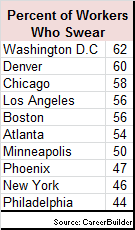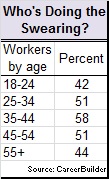It did no good for Richard Nixon, whose famous mountain of secret White House tapes contains thousands of words described only as “expletive deleted” in the official transcripts. It made him seem more like one of the Goodfellas than a good fellow.
Now, as if we needed more proof that cursing on the job is bad for your career, CareerBuilder tells us that 64 percent of employers think less of an employee who repeatedly uses curse words, and 57 percent said they’d be less likely to promote someone who swears in the office. Cussing, swearing, using foul language, all evidence a lack of professionalism, say 81 percent of employers.
Yet, like American presidents from the time of Washington (who had to caution against the rising use of profanity in his Continental army) to Barack Obama, who went looking for an “ass to kick” over the Gulf oil spill, profanity in the workplace is more common than you might think. CareerBuilder’s survey found 51 percent of workers fessing up to cussing, with men outnumbering women 54 percent to 47 percent.
Washington, DC workers curse the most
It’s probably also no surprise that CareerBuilder found Washington, DC the city where people curse the most. Some 62 percent of the workers in the nation’s capital say they swear. The least cussingest place on the CareerBuilder list? Appropriately enough, it’s the City of Brotherly Love, where only 44 percent of Philadelphia workers admit to using profanity in the workplace.
 Young workers were the least likely to say they used bad language on the job, while mid-career workers were the most likely.
Young workers were the least likely to say they used bad language on the job, while mid-career workers were the most likely.
These days, it’s not just the profane outburst that can be a career killer, but the ever more common Facebook posting or tweet that can lead to an outright dismissal.
The NLRB upheld the discipline of a Wal-Mart employee who used profanity in a Facebook posting complaining about her boss. In other cases involving profane or vulgar language, the NLRB ruled against the employers after finding the posting employees were engaging in “concerted activity” and were discussing the terms and conditions of employment.
Analyzing these cases and the NLRB’s lengthy social media guidance last year, Littler Mendelson attorney Roger Gordon said the NLRB, “effectively is telling employers that they must have a thicker skin when it comes to employees’ raunchy social media posts.”
Termination for blowing up on the job
On the other hand, blowing up at a co-worker, boss or subordinate can alone be a legitimate reason for termination. In New Hampshire, a boy’s basketball coach was fired for swearing at one of his players. In Arkansas, the state Supreme Court ruled in a disability case that misconduct and insubordination didn’t disqualify a worker from receiving benefits.
In California (and some other states) employers may terminate an employee for their language, but they may not be able to stop them from collecting unemployment benefits. A state law allows a little vulgarity, disallowing benefits only,
…when such remarks are unjustified under the circumstances, and not within the normal exchange and customary good-natured banter between the employer or the employer’s representative and the employee.
However, if the same conduct occurs in Australia, well mate, that’s just part of life. There, Fair Work Australia (the country’s enforcer of workplace laws and rules) regularly reinstates workers fired for obscenity, vulgarity, and even outright threats.
In June, the agency order the reinstatement of a security guard who dropped the F word a few times on his boss, while raising his fist and poking a finger into a bulletin board. The security firm admitted it had a workplace where swearing occurred
In another case, a fisherman fired for swearing at his boss and refusing to work on a weekend won his appeal to Fair Work Australia. Tsk, tsk, said the agency, of the fisherman’s conduct, however swearing at the boss is so not necessarily a fireable offense.
